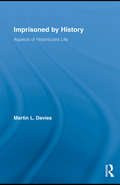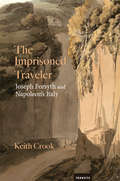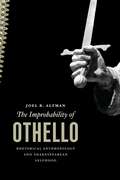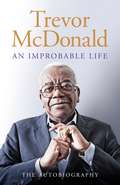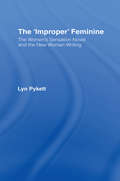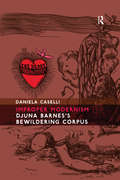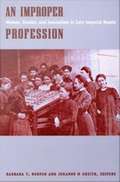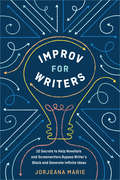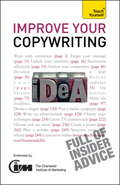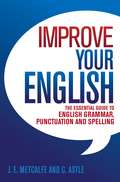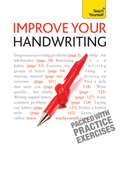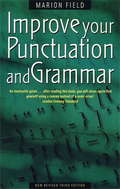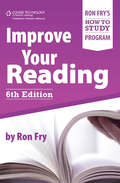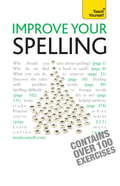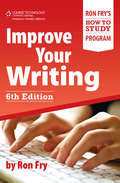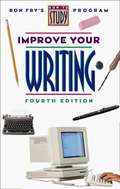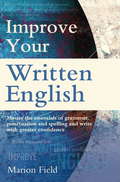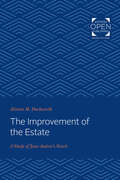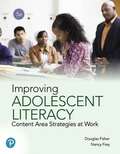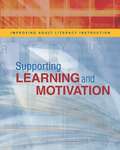- Table View
- List View
Imprisoned by History: Aspects of Historicized Life (Routledge Approaches to History)
by Martin L. DaviesImprisoned by History: Aspects of Historicized Life offers a controversial analysis, grounded both in philosophical argument and empirical evidence, of what history does in contemporary culture. It endorses and extends the argument that contemporary society is, in historical terms, already historicized, shaped by history – and thus history loses sight of the world, seeing it only as a reflection of its own self-image. By focusing on history as a way of thinking about the world, as a thought-style, this volume delivers a major, decisive, thought-provoking critique of a crucial aspect contemporary culture and the public sphere. By illustrating the ways in which history enforces socially coercive attitudes and forms of behaviour, Martin Davies argues that history is therefore in itself ideological and exists as an instrument of political power. Contending that this ideological function is the "normal" function of professional academic history, he repudiates entirely the conventional view that only biased or "bad" history is ideological. By finding history projecting onto the world and getting reflected back at it the exacting, history-focused thinking and behaviour on which the discipline and the subject rely, he concludes that history’s very "normality" and "objectivity" are inherently compromised and that history works only in terms of its own self-interest.
The Imprisoned Traveler: Joseph Forsyth and Napoleon's Italy (Transits: Literature, Thought & Culture 1650-1850)
by Keith CrookThe Imprisoned Traveler is a fascinating portrait of a unique book, its context, and its elusive author. Joseph Forsyth, traveling through an Italy plundered by Napoleon, was unjustly imprisoned in 1803 by the French as an enemy alien. Out of his arduous eleven-year “detention” came his only book, Remarks on Antiquities, Arts, and Letters during an Excursion in Italy (1813). Written as an (unsuccessful) appeal for release, praised by Forsyth’s contemporaries for its originality and fine taste, it is now recognized as a classic of Romantic period travel writing. Keith Crook, in this authoritative study, evokes the peculiar miseries that Forsyth endured in French prisons, reveals the significance of Forsyth’s encounters with scientists, poets, scholars, and ordinary Italians, and analyzes his judgments on Italian artworks. He uncovers how Forsyth’s allusiveness functions as a method of covert protest against Napoleon and reproduces the hitherto unpublished correspondence between the imprisoned Forsyth and his brother. Published by Bucknell University Press. Distributed worldwide by Rutgers University Press.
The Improbability of Othello: Rhetorical Anthropology and Shakespearean Selfhood
by Joel B. AltmanShakespeare’s dramatis personae exist in a world of supposition, struggling to connect knowledge that cannot be had, judgments that must be made, and actions that need to be taken. For them, probability—what they and others might be persuaded to believe—governs human affairs, not certainty. Yet negotiating the space of probability is fraught with difficulty. Here, Joel B. Altman explores the problematics of probability and the psychology of persuasion in Renaissance rhetoric and Shakespeare’s theater.Focusing on the Tragedy of Othello, Altman investigates Shakespeare’s representation of the self as a specific realization of tensions pervading the rhetorical culture in which he was educated and practiced his craft. In Altman’s account, Shakespeare also restrains and energizes his audiences’ probabilizing capacities, alternately playing the skeptical critic and dramaturgic trickster. A monumental work of scholarship by one of America’s most respected scholars of Renaissance literature, The Improbability of Othello contributes fresh ideas to our understanding of Shakespeare’s conception of the self, his shaping of audience response, and the relationship of actors to his texts.
An Improbable Life: The Autobiography
by Trevor McDonaldSir Trevor McDonald is an extraordinary man - and he has led an improbable life. Now in his 80th year, he is known and loved by people the world over for his humility, charm and natural ease. As a natural storyteller and communicator, he has few equals. In An Improbable Life, Sir Trevor recounts his personal experience of world events and interviews with globally famous - or notorious - figures. He has witnessed war and death and risked his own life to meet and talk with despots and liberators. We read about his first trip to South Africa, and obtaining the first British television interview with Nelson Mandela; his reflections on the Windrush generation; and experiencing Barack Obama's momentous inauguration as President of the USA. We are also present at his dramatic meetings with Saddam Hussein (the first and only one by a British television correspondent) and Muammar Gaddafi.Engaging, intimate and moving, this is the life story of an exceptional journalist and broadcaster who over decades has expertly revealed to us history in the making.
The 'Improper' Feminine: The Women's Sensation Novel and the New Woman Writing
by Lyn PykettThe women's sensation novel of the 1860s and the New Woman fiction of the 1890s were two major examples of a perceived feminine invasion of fiction which caused a critical furore in their day. Both genres, with their shocking, `fast' heroines, fired the popular imagination by putting female sexuality on the literary agenda and undermining the `proper feminine' ideal to which nineteenth-century women and fictional heroines were supposed to aspire. By exploring in impressive depth and breadth the material and discursive conditions in which these novels were produced, The `Improper' Feminine draws attention to key gendered interrelationships within the literary and wider cultures of the mid-Victorian and fin-de-diècle periods.
Improper Modernism: Djuna Barnes's Bewildering Corpus
by Daniela CaselliIn her compelling reexamination of Djuna Barnes's work, Daniela Caselli raises timely questions about Barnes, biography and feminist criticism, identity and authority, and modernist canon formation. Through close readings of Barnes's manuscripts, correspondence, critically acclaimed and little-known texts, Caselli tackles one of the central unacknowledged issues in Barnes: intertextuality. She shows how throughout Barnes's corpus the repetition of texts, by other authors (from Blake to Middleton) and by Barnes herself, forces us to rethink the relationship between authority and gender and the reasons for her marginal place within modernism. All her texts, linked as they are by correspondences and permutations, wage a war against the common sense of the straight mind. Caselli begins by analyzing how literary criticism has shaped our perceptions of Barnes, showing how the various personae assigned to Barnes are challenged when the right questions are posed: Why is Barnes such a famous author when many of her texts remain unread, even by critics? Why has criticism reduced Barnes's work to biographical speculations? How can Barnes's hybrid, eccentric, and unconventional corpus be read as part of literary modernism when it often seems to sever itself from it? How can an oeuvre reject the labels of feminist and lesbian literature, whilst nevertheless holding at its centre the relationships between language, sexuality, and the real? How can Barnes's work help us to rethink the relation between simplicity and difficulty within literary modernism? Caselli concludes by arguing that Barnes's complex and bewildering work is committed to a high modernist notion of art as a supremely difficult undertaking whilst refusing to conform to standards of modernist acceptability.
An Improper Profession: Women, Gender, and Journalism in Late Imperial Russia
by Barbara T. Norton Jehanne M. GheithJournalism has long been a major factor in defining the opinions of Russia's literate classes. Although women participated in nearly every aspect of the journalistic process during the nineteenth and early twentieth centuries, female editors, publishers, and writers have been consistently omitted from the history of journalism in Imperial Russia. An Improper Profession offers a more complete and accurate picture of this history by examining the work of these under-appreciated professionals and showing how their involvement helped to formulate public opinion. In this collection, contributors explore how early women journalists contributed to changing cultural understandings of women's roles, as well as how class and gender politics meshed in the work of particular individuals. They also examine how female journalists adapted to--or challenged--censorship as political structures in Russia shifted. Over the course of this volume, contributors discuss the attitudes of female Russian journalists toward socialism, Russian nationalism, anti-Semitism, women's rights, and suffrage. Covering the period from the early 1800s to 1917, this collection includes essays that draw from archival as well as published materials and that range from biography to literary and historical analysis of journalistic diaries. By disrupting conventional ideas about journalism and gender in late Imperial Russia, An Improper Profession should be of vital interest to scholars of women's history, journalism, and Russian history. Contributors. Linda Harriet Edmondson, June Pachuta Farris, Jehanne M Gheith, Adele Lindenmeyr, Carolyn Marks, Barbara T. Norton, Miranda Beaven Remnek, Christine Ruane, Rochelle Ruthchild, Mary Zirin
Improv for Writers: 10 Secrets to Help Novelists and Screenwriters Bypass Writer's Block and Generate Infinite Ideas
by Jorjeana MarieFree yourself from writer’s block and inner critics with the creative power of improv! “Jorjeana Marie’s generous, joyful, and oh-so-useful book shows writers—both seasoned and new—how to unleash their creativity and find their best story.”—Gayle Forman, New York Times bestselling author of If I Stay and I Have Lost My Way Improv instructor and writer Jorjeana Marie reveals a new way to generate idea after brilliant idea. Applying the rules of improv to fiction writing, Marie presents fun games and exercises you can do from the comfort of your desk at home. Surprise yourself with new plots, infinite characters and settings, and a supreme confidence in your own process. Armed with the power of improv—and liberating exercises like Ad Agency, Raise the Stakes, and Family Portraits—you’ll soon be an idea machine. With Improv for Writers, your creative storytelling well will never run dry again.Advance praise for Improv for Writers“Here’s a secret. Many authors started out as drama geeks and later found that theatrical skills like deep-diving into character and improvising on the fly were essential tools for writing fiction. Jorjeana Marie’s generous, joyful and oh-so useful book applies the principles of improv to writing and though a series of targeted, fun exercises shows writers—both the seasoned and the new—how to unleash their creativity and find their best story.”—Gayle Forman, New York Times bestselling author of If I Stay and I Have Lost My Way “Part practical, part playful, part encouraging and affirming, Jorjeana Marie’s Improv for Writers is a certain antidote to writing blocks—and writer’s block! This book is a necessary and vital tool for authors and storytellers everywhere.”—Karma Brown, bestselling author of The Life Lucy Knew“Thank you, Jorjeana Marie for infusing joy and play and experimentation in the often-arduous act of writing fiction. I'll be turning to these exercises whenever I need to jump-start my writing session and will be recommending many of my writing students to do the same.”—Nina LaCour, Michael L. Printz Award-winning author of We Are Okay, Hold Still, The Disenchantments, and Everything Leads to You; and You Know Me Well, a novel written in collaboration with David Levithan.
Improve Your Copywriting: Teach Yourself
by Jonathan GabayFully revised for today's practical copywriting requirements, Improve your Copywriting, by one of the UK's leading copywriters, reveals some of advertising's greatest creative secrets. From planning to implementation, it will guide you step-by-step through copywriting skills for a range of disciplines, including: - the internet - radio and TV - business-to-business - public relations - recruitment - charities - ...and many more! Throughout the book you'll find quick tips and author insights summarizsng what you have read and exercises for you to do. A practical glossary with useful addresses will help you to build you skills even further. So if you are ready to have fun whilst learning how to succeed in one of the most exciting areas of marketing communications, read this book and explore your full copywriting potential. NOT GOT MUCH TIME? One and five-minute introductions to key principles to get you started. AUTHOR INSIGHTS Lots of instant help with common problems and quick tips for success, based on the author's many years of experience. TEST YOURSELF Tests in the book and online to keep track of your progress. EXTEND YOUR KNOWLEDGE Extra online articles at www.teachyourself.com to give you a richer understanding of copywriting. TRY THIS Innovative exercises illustrate what you've learnt and how to use it.
Improve Your English: The Essential Guide to English Grammar, Punctuation and Spelling
by J. E. Metcalfe C AstleIt's important in our daily lives for us to write clear English which is easily understood. If we get the basics wrong, our words may be misinterpreted and cause confusion. To make sure our written words convey our exact meanings, we need to understand the fundamentals of the English language, such as the parts of speech, how sentences and paragraphs are constructed, and the correct use of punctuation. We also need to spell the words correctly!This indispensable reference guide to the rules and conventions governing written English will help all those who are unsure about whether to use "its" or "it's", or a colon instead of a comma, or how to spell words such as "separate".
Improve Your English: The Essential Guide to English Grammar, Punctuation and Spelling
by J.E. Metcalfe C AstleIt's important in our daily lives for us to write clear English which is easily understood. If we get the basics wrong, our words may be misinterpreted and cause confusion. To make sure our written words convey our exact meanings, we need to understand the fundamentals of the English language, such as the parts of speech, how sentences and paragraphs are constructed, and the correct use of punctuation. We also need to spell the words correctly!This indispensable reference guide to the rules and conventions governing written English will help all those who are unsure about whether to use "its" or "it's", or a colon instead of a comma, or how to spell words such as "separate".
Improve Your Handwriting: Teach Yourself (TY Home Reference)
by Rosemary SassoonImprove Your Handwriting is the only title to be written specifically for adults who are experiencing problems with their writing. Co-authored by a world-renowned expert on handwriting and a professional calligrapher, it uses self-diagnosis tests to help you identify your problem, before encouraging you to experiment and choose the style that suits you best. Covering everything from holding a pen, to the difficulties that left-handers face, and the problems that may be caused by medical conditions, you will be come away from the book armed with the ability to write with ease and confidence. NOT GOT MUCH TIME? One, five and ten-minute introductions to key principles to get you started. AUTHOR INSIGHTS Lots of instant help with common problems and quick tips for success, based on the authors' many years of experience. TEST YOURSELF Tests in the book and online to keep track of your progress. EXTEND YOUR KNOWLEDGE Extra online articles at www.teachyourself.com to give you a richer understanding of improving your handwriting. FIVE THINGS TO REMEMBER Quick refreshers to help you remember the key facts. TRY THIS Innovative exercises illustrate what you've learnt and how to use it.
Improve Your Handwriting: Learn to write in a confident and fluent hand: the writing classic for adult learners and calligraphy enthusiasts
by Rosemary Sassoon G S BriemImprove Your Handwriting is the only title to be written specifically for adults who are experiencing problems with their writing. Co-authored by a world-renowned expert on handwriting and a professional calligrapher, it uses self-diagnosis tests to help you identify your problem, before encouraging you to experiment and choose the style that suits you best. Covering everything from holding a pen, to the difficulties that left-handers face, and the problems that may be caused by medical conditions, you will be come away from the book armed with the ability to write with ease and confidence.NOT GOT MUCH TIME?One, five and ten-minute introductions to key principles to get you started.AUTHOR INSIGHTSLots of instant help with common problems and quick tips for success, based on the authors' many years of experience.TEST YOURSELFTests in the book and online to keep track of your progress.EXTEND YOUR KNOWLEDGEExtra online articles at www.teachyourself.com to give you a richer understanding of improving your handwriting.FIVE THINGS TO REMEMBERQuick refreshers to help you remember the key facts.TRY THISInnovative exercises illustrate what you've learnt and how to use it.
Improve Your Punctuation and Grammar
by Marion FieldMaster the essentials of the English language and write with greater confidence.
Improve Your Punctuation and Grammar
by Marion FieldMaster the essentials of the English language and write with greater confidence.
Improve Your Reading (Ron Fry's How to Study Program #5)
by Ron FryProven strategies for better reading skills—from comprehension, focus, and retention to overcoming challenges such as ADD. Whether it’s for education or enjoyment, reading can be challenging. Understanding and remembering what you’ve read, and keeping focus and concentration when you have to read long or difficult texts, takes certain skills. Luckily, those skills can be learned and improved. In Improve Your Reading, education expert Ron Fry offers practical solutions to the reading-related frustrations all readers—and students—face. No gimmicks, no tricks, just proven techniques for any course, any academic level, any situation, and anyone in need of the essential tools to succeed in the classroom and beyond. You’ll discover:Basic, necessary study skillsHow to read with a purposeHow to focus on the main ideaHow to overcome the challenges of technical textsThe art of becoming a critical readerWays to retain informationAdvice on how to start building your own libraryTips for reading with ADD or other challengesIdeas for parents to help their childrenWays for teachers to encourage their students Reading is the key to success—and this clear, simple guide is the key to reading!
Improve Your Spelling: Teach Yourself (Teach Yourself General)
by Elspeth SummersThis practical guide to spelling will help you to feel more confident by teaching you simple strategies to boost your ability. You'll learn which words are commonly misspelt and how to avoid falling into these traps. With simple rules and guidelines to follow, you'll discover when it's acceptable to misspell and when it's not, and you will finally learn how to enjoy - rather than fear - the written word. With plenty of exercises, crosswords and games to practice and perfect your skills, your spelling will never let you down again. NOT GOT MUCH TIME?One, five and ten-minute introductions to key principles to get you started.AUTHOR INSIGHTSLots of instant help with common problems and quick tips for success, based on the authors' many years of experience.TEST YOURSELFTests in the book and online to keep track of your progress.EXTEND YOUR KNOWLEDGEExtra online articles at www.teachyourself.com to give you a richer understanding of spelling.FIVE THINGS TO REMEMBERQuick refreshers to help you remember the key facts.TRY THISInnovative exercises illustrate what you've learnt and how to use it.
Improve Your Spelling: Teach Yourself (Teach Yourself General Ser.)
by Elspeth SummersThis practical guide to spelling will help you to feel more confident by teaching you simple strategies to boost your ability. You'll learn which words are commonly misspelt and how to avoid falling into these traps. With simple rules and guidelines to follow, you'll discover when it's acceptable to misspell and when it's not, and you will finally learn how to enjoy - rather than fear - the written word. With plenty of exercises, crosswords and games to practice and perfect your skills, your spelling will never let you down again. NOT GOT MUCH TIME?One, five and ten-minute introductions to key principles to get you started.AUTHOR INSIGHTSLots of instant help with common problems and quick tips for success, based on the authors' many years of experience.TEST YOURSELFTests in the book and online to keep track of your progress.EXTEND YOUR KNOWLEDGEExtra online articles at www.teachyourself.com to give you a richer understanding of spelling.FIVE THINGS TO REMEMBERQuick refreshers to help you remember the key facts.TRY THISInnovative exercises illustrate what you've learnt and how to use it.
Improve Your Writing
by Ron FryFrom selecting a topic and conducting research to developing an outline, writing drafts, proofreading, and more, Improve Your Writing takes you step-by-step through the creation of a successful research paper. Applicable to any kind of writing addressing any subject matter, author Ron Fry's fundamental and systematic approach goes beyond one size fits all checklists to offer real advice that can be adapted according to your individual needs and situations. Ideal for anyone hoping to establish essential research, organization, and writing skills, the text empowers you to excel in school, on essay tests, and in life.
Improve Your Writing: Fourth Edition
by Ron FryImprove Your Writing, now in an updated and expanded edition that covers online research, walks students step by step through the process of creating effective research papers and oral reports Ron Fry covers every element of the process selecting a topic, library and online research, developing an outline, writing from the first draft to the final draft, proofreading, and much more.
Improve Your Written English: Master The Essentials Of Grammar, Punctuation And Spelling And Write With Greater Confidence (How To Bks)
by Marion FieldWritten in short, accessible sections, this book explains the basics of writing good English. It includes punctuation, sentence construction and spelling. You will learn how to adopt different tasks, such as writing a report, essay or short story. There are also chapters on letter writing, filling in forms and constructing job applications.
Improve Your Written English: Master the essentials of grammar, punctuation and spelling and write with greater confidence
by Marion FieldWritten in short, accessible sections, this book explains the basics of writing good English. It includes punctuation, sentence construction and spelling. You will learn how to adopt different tasks, such as writing a report, essay or short story. There are also chapters on letter writing, filling in forms and constructing job applications.
The Improvement of the Estate: A Study of Jane Austen's Novels
by Alistair M. DuckworthOriginally published in 1994. In The Improvement of the Estate, Alistair Duckworth contends that understanding Mansfield Park is fundamental to appreciating Jane Austen's body of work. Professor Duckworth understands Mansfield Park as underscoring the central uniting theme in Austen's work—her concept of the "estate" and its "improvement." The author illustrates Austen's connection to the values of Christian humanism, which she conveys through the uniting theme of estate improvement. According to Duckworth, the estate represents moral and social heritage, so the manner in which individuals seek to improve their estates in Jane Austen's novels represents the direction in which she saw the state and society moving. Finally, Duckworth underscores Austen's awareness of the importance of a society of individuals whose behavior is socially informed.
Improving Adolescent Literacy: Content Area Strategies at Work
by Douglas Fisher Nancy FreyStraightforward, affordable, and practical, Improving Adolescent Literacy gives all middle and secondary school teachers instructional routines that will allow them to develop the content literacy skills of their students. Chapter-opening vignettes from actual classrooms show readers effective teaching in action and give them a look at how the chapter’s instructional approach works within content area teaching. Research-based rationales for each strategy follow the vignettes and provide an in-depth look at how to implement the strategy, along with examples of each strategy across the curriculum. In this 5th Edition, the authors provide new classroom examples from their colleagues across the disciplines as well as new instructional routines that have been researched and validated since the publication of the last edition. Also, this edition has been re-organized, adding three new chapters, to focus on the ways in which teachers can use reading, writing, speaking, and listening in their classes, emphasizing reading and comprehending texts, creating graphic organizers, developing vocabulary knowledge, and writing to learn.
Improving Adult Literacy Instruction: Supporting Learning and Motivation
by M. ChiangVirtually everyone needs a high level of literacy in both print and digital media to negotiate most aspects of 21st century life-succeeding in a competitive job market, supporting a family, navigating health information, and participating in civic activities. Yet, according to a recent survey estimate, more than 90 million adults in the United States lack the literacy skills needed for fully productive and secure lives. At the request of the U. S. Department of Education, the National Research Council convened a committee of experts from many disciplines to synthesize research on literacy and learning in order to improve instruction for those served in adult education in the U. S. The committee's report, Improving Adult Literacy Instruction: Options for Practice and Research, recommends a program of research and innovation to gain a better understanding of adult literacy learners, improve instruction, and create the supports adults need for learning and achievement. Improving Adult Literacy Instruction: Supporting Learning and Motivation, which is based on the report, describes principles of effective instruction to guide those who design and administer adult literacy programs and courses. It also explores ways to motivate learners to persist in their studies, which is crucial given the thousands of hours of study and practice required to become proficient. The booklet concludes with a look at technologies that show promise for supporting individual learners and freeing busy adults from having to be in a particular place in order to practice their literacy skills. Although this booklet is not intended as a "how to" manual for instructors, teachers may also find the information presented here to be helpful as they plan and deliver instruction.
